Jeep Compass VS VW Arteon – Specs, Efficiency & Price Comparison
Which model is the better choice – the Jeep Compass or the VW Arteon? We compare performance (240 HP vs 320 HP), boot capacity (438 L vs 590 L), efficiency (2 L vs 5.10 L), and of course, the price (34200 £ vs 43300 £).
Find out now which car fits your needs better!
The Jeep Compass (SUV) is powered by a Petrol MHEV or Plugin Hybrid engine and comes with a Automatic transmission. In comparison, the VW Arteon (Estate) features a Diesel or Petrol engine and a Automatic gearbox.
When it comes to boot capacity, the Jeep Compass offers 438 L, while the VW Arteon provides 590 L – depending on what matters most to you. If you’re looking for more power, you’ll need to decide whether the 240 HP of the Jeep Compass or the 320 HP of the VW Arteon suits your needs better.
There are also differences in efficiency: 2 L vs 5.10 L. In terms of price, the Jeep Compass starts at 34200 £, while the VW Arteon is available from 43300 £.
Compare all the key specs now and find out which model fits your lifestyle best!
Jeep Compass
The Jeep Compass combines a rugged aesthetic with modern sophistication, making it a standout choice in the compact SUV segment. Its robust design is complemented by a comfortable interior that offers ample space and cutting-edge technology for a seamless driving experience. Whether tackling urban environments or venturing off-road, the Compass provides versatility and reliability, embodying the adventurous spirit synonymous with the Jeep brand.
details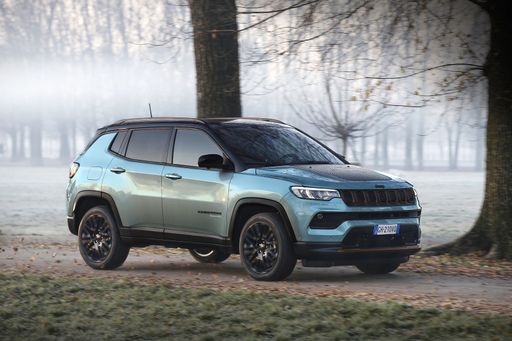 @ media.stellantis.com
@ media.stellantis.com
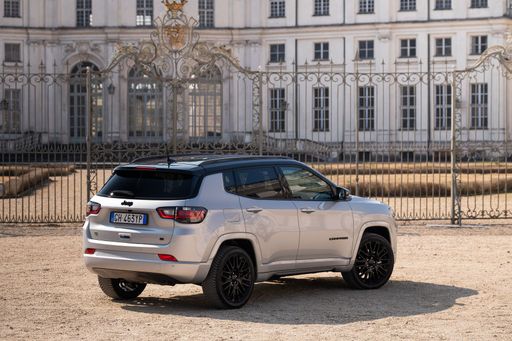 @ media.stellantis.com
@ media.stellantis.com
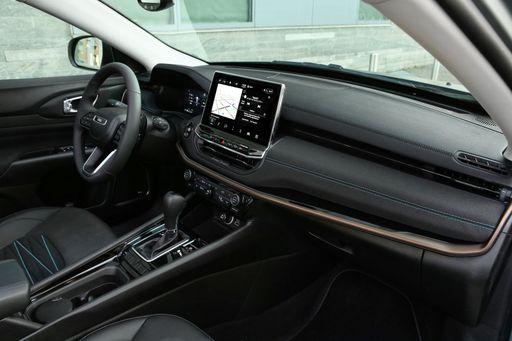 @ media.stellantis.com
@ media.stellantis.com
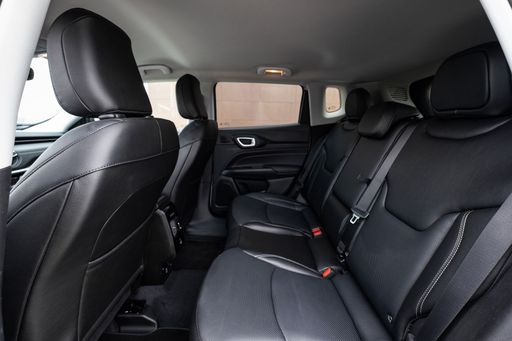 @ media.stellantis.com
@ media.stellantis.com
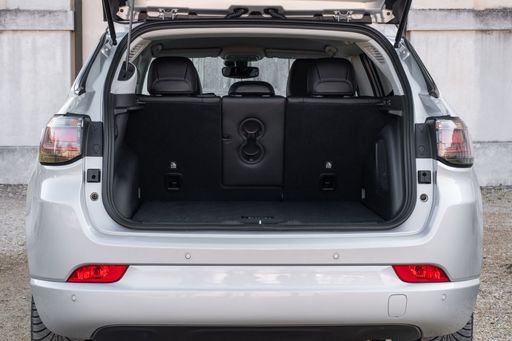 @ media.stellantis.com
@ media.stellantis.com
VW Arteon
The VW Arteon is a striking example of modern automotive design, combining sleek aesthetics with cutting-edge technology. Its dynamic silhouette and expressive front grille give it an unmistakable presence on the road, appealing to those who value style and sophistication. Inside, the cabin offers a seamless blend of comfort and connectivity, ensuring a premium experience for both driver and passengers.
details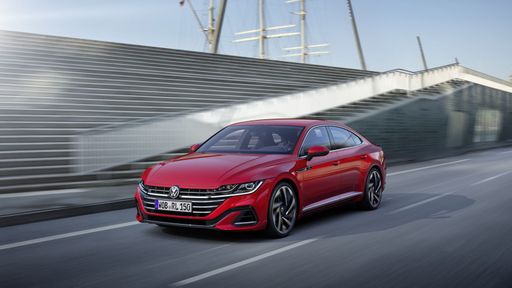 @ Volkswagen
@ Volkswagen
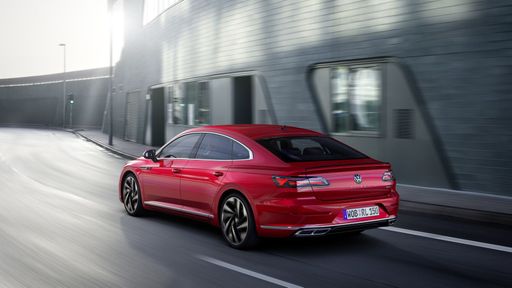 @ Volkswagen
@ Volkswagen
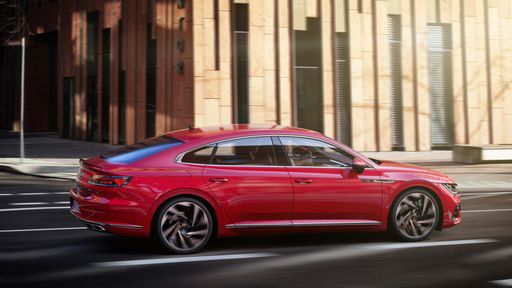 @ Volkswagen
@ Volkswagen
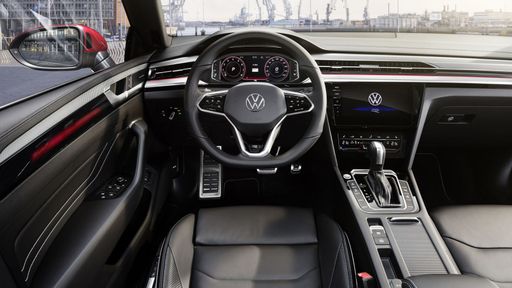 @ Volkswagen
@ Volkswagen

|

|
|
|
|
Costs and Consumption |
|
|---|---|
|
Price
34200 - 46900 £
|
Price
43300 - 60800 £
|
|
Consumption L/100km
2 - 5.5 L
|
Consumption L/100km
5.1 - 8.6 L
|
|
Consumption kWh/100km
-
|
Consumption kWh/100km
-
|
|
Electric Range
36 km
|
Electric Range
-
|
|
Battery Capacity
-
|
Battery Capacity
-
|
|
co2
47 - 124 g/km
|
co2
133 - 195 g/km
|
|
Fuel tank capacity
36 - 55 L
|
Fuel tank capacity
66 L
|
Dimensions and Body |
|
|---|---|
|
Body Type
SUV
|
Body Type
Estate
|
|
Seats
5
|
Seats
5
|
|
Doors
5
|
Doors
5
|
|
Curb weight
1575 - 1935 kg
|
Curb weight
1607 - 1773 kg
|
|
Trunk capacity
420 - 438 L
|
Trunk capacity
590 L
|
|
Length
4404 mm
|
Length
4866 mm
|
|
Width
1819 mm
|
Width
1871 mm
|
|
Height
1629 - 1649 mm
|
Height
1434 - 1451 mm
|
|
Payload
465 - 470 kg
|
Payload
467 - 569 kg
|
Engine and Performance |
|
|---|---|
|
Engine Type
Petrol MHEV, Plugin Hybrid
|
Engine Type
Diesel, Petrol
|
|
Transmission
Automatic
|
Transmission
Automatic
|
|
Transmission Detail
Automat. Schaltgetriebe (Doppelkupplung), Automatikgetriebe
|
Transmission Detail
Dual-Clutch Automatic
|
|
Drive Type
Front-Wheel Drive, All-Wheel Drive
|
Drive Type
Front-Wheel Drive, All-Wheel Drive
|
|
Power HP
130 - 240 HP
|
Power HP
150 - 320 HP
|
|
Acceleration 0-100km/h
7.3 - 10 s
|
Acceleration 0-100km/h
4.9 - 9.4 s
|
|
Max Speed
183 - 200 km/h
|
Max Speed
216 - 250 km/h
|
|
Torque
240 Nm
|
Torque
320 - 420 Nm
|
|
Number of Cylinders
4
|
Number of Cylinders
4
|
|
Power kW
96 - 177 kW
|
Power kW
110 - 235 kW
|
|
Engine capacity
1332 - 1469 cm3
|
Engine capacity
1968 - 1984 cm3
|
General |
|
|---|---|
|
Model Year
2024
|
Model Year
2024
|
|
CO2 Efficiency Class
D, B
|
CO2 Efficiency Class
D, E, F, G
|
|
Brand
Jeep
|
Brand
VW
|
Jeep Compass
Exploring the Jeep Compass: A Modern SUV with Innovative Features
The Jeep Compass continues to challenge the boundaries of what an SUV can be, offering a blend of practicality, efficiency, and rugged appeal. This model, distinguished by its diverse range of powertrains, promises to cater to various needs and preferences. From urban commuting to exploring off-road trails, the Compass delivers with aplomb.
Engine Versatility and Performance
Under the bonnet, the Jeep Compass offers a diverse lineup of engines designed to meet varying driver demands. With options ranging from mild hybrid petrol engines to advanced Plug-in Hybrid Electric Vehicles (PHEVs), the Compass provides both efficiency and power. This impressive engine choice results in power outputs from 130 to 240 PS, ensuring that there is a model suitable for both city driving and more ambitious off-road excursions.
Performance devotees will appreciate the Compass's quick acceleration, clocking 0-100 km/h in as little as 7.3 seconds. Meanwhile, fuel economy remains commendable, with consumption figures between 1.7 to 5.5 litres per 100 kilometres, making the Compass an economical choice for daily driving.
Innovative Hybrid Technology
The Jeep Compass brings cutting-edge hybrid technology to the forefront. The available plug-in hybrid variants offer electric-only driving ranges of up to 53 kilometres, ideal for environmentally conscious urban drivers. This zero-emission capability makes short trips sustainable without compromising on the flexibility offered by the internal combustion engine for longer journeys.
Dynamic Drivetrain Options
One of the main talking points of the Compass is its adaptable drivetrain options, which include both front-wheel drive and all-wheel drive systems. The 4xe PHEV models particularly stand out with their all-wheel drive, providing enhanced stability and traction suitable for varying terrains. Additionally, the automated transmission ensures smooth gear changes and an overall comfortable driving experience.
Design and Comfort
Beyond performance, the Jeep Compass excels in providing a stylish and functional environment. The SUV's dimensions, ranging between 4398 to 4404 mm in length and up to 1874 mm in width, offer ample interior space for both passengers and cargo. The boot space varies from 420 to 438 litres, accommodating the needs of families and adventure-seekers alike.
With seating for five, maximum comfort is assured, thanks to high-quality materials and thoughtfully designed interiors. The Compass integrates advanced technology seamlessly into its cabin, ensuring easy connectivity and an engaging driving experience.
Safety and Efficiency
Safety is paramount in the Jeep Compass, with a range of driver assistance features providing peace of mind. The model adheres to impressive CO2 efficiency standards, boasting a CO2 emission range between 37 and 123 g/km, making it both a responsible and reliable choice.
Furthermore, the Compass offers competitive running costs, with monthly expenses ranging from €1,095 to €1,315, and an average cost per kilometre between 43.8 and 52.6 cents. This cost-effectiveness further underscores the Compass’s value proposition.
Conclusion
Overall, the Jeep Compass stands out as a richly equipped, versatile SUV, ready to tackle urban or off-road challenges. With its blend of powertrain innovations, superior performance, and sophisticated design, it redefines what’s possible in the SUV segment. Whether for efficient city driving or adventurous journeys into the unknown, the Compass is ready to rise to the occasion.
VW Arteon
Introducing the Elegant VW Arteon
The VW Arteon represents Volkswagen's commitment to combining style with advanced automotive technology. As a standing testament to German engineering excellence, the Arteon is designed for those who seek to make a statement both on the road and in their everyday lives. This sophisticated model comes in various configurations to meet diverse driving needs.
Performance and Engine Options
Under the bonnet, the Arteon offers a range of engines to suit different preferences. Buyers can choose between petrol and diesel variants, with power outputs ranging from 150 PS to an exhilarating 320 PS. The diesel units are particularly appealing for those mindful of fuel consumption, achieving impressive figures as low as 5.1 L/100km.
The Arteon Shooting Brake R, with its 320 PS petrol engine and all-wheel drive, ensures a thrilling ride, accelerating from 0-100 km/h in just 4.9 seconds. This version showcases the model's peak performance capabilities, wrapped in an aerodynamic design.
Technological Innovations
Innovative technology forms the backbone of the Arteon's sophisticated driving experience. A standout feature is the DSG automatic dual-clutch transmission, ensuring smooth gear changes and optimised performance. VW's 4MOTION all-wheel drive system is available on select models, providing enhanced traction and stability in various driving conditions.
Inside, the Arteon features a state-of-the-art infotainment system, complemented by an advanced driver assistance suite, which includes adaptive cruise control, lane-keeping assistance, and emergency braking systems, all working to enhance safety and convenience.
Efficient and Sustainable
In an era where efficiency is key, the Arteon fits perfectly into Volkswagen's sustainable driving philosophy. The available engines are designed to meet current emission standards, and their efficiency is reflected in CO2 outputs between 133 and 195 g/km, placing them in various CO2 efficiency classes from D to G.
Aesthetic Appeal and Practicality
With dimensions of 4866 mm in length, 1871 mm in width, and a height ranging from 1434 to 1451 mm, the Arteon boasts a striking and aerodynamic silhouette. Its spacious interior and 590-litre boot capacity make it a practical choice for families and professionals alike.
The Arteon maintains a balance of luxury and practicality across all its trim levels, including the DSG, Elegance DSG, R-Line DSG, and their 4MOTION counterparts. These options allow customers to tailor the Arteon to meet both aesthetic and functional preferences.
A Comprehensive Package
Priced between €50,495 and €70,875, the Arteon offers a comprehensive package for a range of budgets. Whether choosing the elegance of the Elegance DSG or the sporty R-Line with 4MOTION, each Arteon promises to deliver an exceptional driving experience synonymous with the Volkswagen brand.
The prices and data displayed are estimates based on German list prices and may vary by country. This information is not legally binding.
